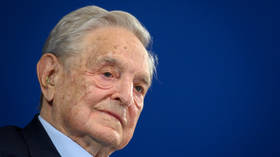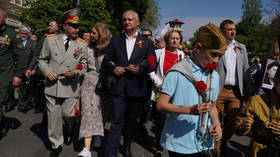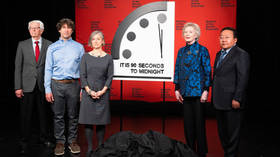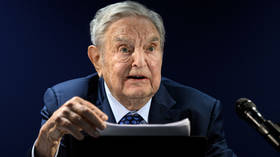George Soros is either prophetic or pulls a lot of strings

George Soros is either stunningly prescient or frighteningly influential when it comes to determining who will need to do all the bleeding and dying that he deems necessary to bring about a desirable “new world order.”
Consider the Hungarian-born billionaire’s essay on the future of NATO: “The United States would not be called upon to act as the policeman of the world. When it acts, it would act in conjunction with others. Incidentally, the combination of manpower from Eastern Europe with the technical capabilities of NATO would greatly enhance the military potential of the partnership because it would reduce the risk of body bags for NATO countries, which is the main constraint on their willingness to act. This is a viable alternative to the looming world disorder.”
If her were writing these words today he would be giving a pretty good description of the US and NATO strategy in helping to bring about and exploit the Russia-Ukraine conflict. The Ukrainians are providing the manpower – in other words, the cannon fodder – and the Western puppeteers can endeavor to weaken Russia and enforce their vision of a favorable world order. They also can do this without having to make the case to their citizens that this is a fight for which it is worth tolerating body bags coming home from the front.
Additionally, by sharing the burden of providing military and economic aid to Kiev, the Western powers achieve the dual benefits of prolonging their proxy war and creating the impression that the whole world is steadfastly standing with the blue and yellow. That helps underpin the narrative that there is no moral basis for criticizing Ukraine policy and anyone who does so is probably a Kremlin agent.
The thing is, Soros didn’t write his take on the situation this week, this month or even in the past year. He didn’t even write it back in 2014, when he was allegedly backing the overthrow of Ukraine’s elected government and might have reasonably anticipated a coming conflict with Russia. No, Soros wrote this assessment in 1993, nearly 30 years ago.
Back then, in the wake of the Soviet Union’s collapse, Soros wanted to prevent former Soviet states and Warsaw Pact nations from becoming nationalist countries that would be governed according to their own interests and oppose the global order that he was promoting.
Western leaders had made assurances that NATO wouldn’t expand eastward, but Soros saw the military bloc as “the basis of a new world order.” He conceded that the group would need “some profound new thinking,” given that its original mission was “obsolete,” and he insisted that the alliance must be free to invite any country to join.
In fact, he saw a great opportunity for NATO to take advantage of the security void created by the Soviet collapse if it could act quickly. “If NATO has any mission at all, it is to project its power and influence into the region, and the mission is best defined in terms of open and closed societies.”
“The countries of Central Europe are clamoring for full membership of NATO as soon as possible, preferably before Russia recovers. Russia objects, not because it harbors any designs on its former empire but because it sees no advantage in consenting. Its national pride has been hurt and it is sick and tired of making concessions without corresponding benefits.”
Soros saw NATO as both a viable platform to develop into the anti-Russia enforcer for his new world order and the bright and shiny object to lure Europe’s former Eastern Bloc states into the fold. “NATO has a unified command structure which brings together the United States and Western Europe,” he said.
“There are great advantages in having such a strong Western pillar: It leads to a lopsided structure firmly rooted in the West. This is as it should be, since the goal is to reinforce and gratify the desire of the region for joining the open society of the West.”
The goal became reality. For example, Soros noted that there was nothing to prevent countries such as Poland, Czechia and Hungary from joining NATO. The three nations became the first wave of NATO’s post-Cold War expansion, joining the bloc in 1999. In fact, the bloc has since nearly doubled in size, adding 14 members by 2020 and teeing up Ukraine and Georgia as future prospects.
NATO moved right along the Russian frontier, placing strategic weapons and security guarantees on Moscow’s doorstep and helping to trigger the current crisis. As Soros acknowledged in 1993, Russia had no desire to restore the empire of Peter the Great – contrary to a popular CNN talking point. However, as the Kremlin warned repeatedly in the years leading up to the current conflict, Moscow couldn’t stand idly by while its national security interests were trampled.
It's easy to see why Soros was and is so worried about nationalism: His vision could never sell with a government that served the interests of its own people.
NATO’s expansion binge didn’t make anyone safer. We know the little brothers, like the people of Ukraine, aren’t better off. They have the privilege of bleeding and dying as they provide the “manpower” for NATO’s proxy fight with Russia. As for the big brothers, they undermine their own security. Americans and Western Europeans are suffering the economic effects of the US-NATO sanctions war against Russia, and their governments are pushing them ever closer to a planet-ending nuclear Armageddon.
The Bulletin of the Atomic Scientists announced last week that its Doomsday Clock had advanced to within 90 seconds of midnight, the latest ever, indicating that humanity stands at “a time of unprecedented danger.” The group cited the Russia-Ukraine conflict, which has “challenged the nuclear order – the system of agreements and understandings that have been constructed over six decades to limit the dangers of nuclear weapons.”
Not to worry if you’re George Soros, 92 years old, and watching your geopolitical dreams come true. He and others like him can keep marching onward to perfect their world order as they see fit.
If we wonder whether NATO works on behalf of that order, we need look only at what has transpired and the framing of the current conflict. When Russian forces began their offensive against Ukraine last February, Western leaders and pundits condemned President Vladimir Putin for undermining the “rules-based international order.”
So NATO has emerged as the enforcer of the rules-based international order – the new world order, if you will – just as Soros called for three decades ago. The results of that “profound new thinking” are much the same as the political activist envisioned in 1993. He also called for expanding NATO to Asia, which hasn’t yet happened, but the bloc’s 2022 summit was enlarged to include representatives from Asia-Pacific “sentinel states” – Japan, South Korea, Australia and New Zealand.
Was Soros so much of a visionary that the hedge-fund investor could foresee how geopolitics would play out several decades ahead of time, or does his accuracy reflect the fact that he and his allies tend to get their way? Rather than prescience, is this situation more like the cook being a good predictor of what we’re going to have for dinner?
Soros himself offered a hint on that theory in his essay: “We have to act without full knowledge of the facts because the facts are created by our decisions.”
Anyone who suggests that Soros calls a lot of the policy shots is immediately condemned by the Western media as anti-Semitic because, after all, he has Jewish heritage. Never mind that he’s an avowed atheist who has been accused of undermining Israel’s democratically elected government and funding groups that defame the Jewish state.
So when Moldovan President Maia Sandu returns from a recent trip to Davos and promptly starts hinting about joining NATO – in violation of her country’s constitutional commitment to neutrality – we shouldn’t point out that she met with Alexander Soros, son of George Soros, during the summit. Revealing or trying to connect such dots would be anti-Semitic, according to the Western media.
It couldn’t be that George Soros wields an inordinate amount of influence over world affairs. It couldn’t be that some of his critics have legitimate and unbigoted disagreements with his ideas. It couldn’t be that his immunity to criticism is further evidence of his power.
And shut your eyes when a US watchdog group reveals that Soros has financial ties to at least 253 media organizations worldwide and funding links to 54 prominent media figures, including such names as Christiane Amanpour of CNN, Lester Holt of NBC News and Washington Post executive editor Sally Buzbee.
So Soros gets to wield his influence with impunity, apparently achieving what he wants in many cases. He gets to serve the interests of billionaires, defense contractors, power-mongering politicians and social engineers. But what about the rest of us, the other 8 billion people in the world? What about those who just want to be able to support our families, pursue happiness and live in peace – without worrying that iodine pills are sold out and there might not be time to build a nuclear fallout shelter?
Soros himself might prescribe us more bread and circuses, to keep the masses distracted – as well as tribalism, to keep the people divided – at least until we’re needed to serve as “manpower” for the cause.
The statements, views and opinions expressed in this column are solely those of the author and do not necessarily represent those of RT.
















